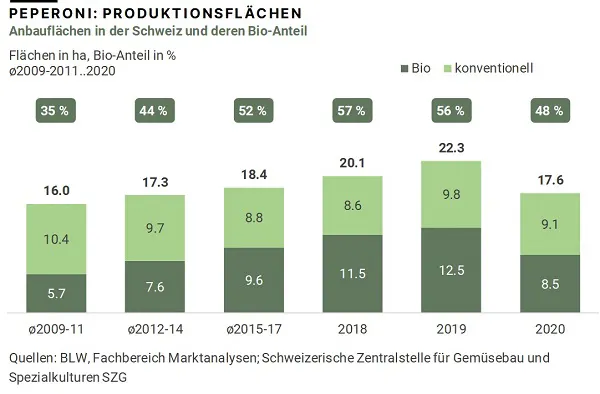With a per capita consumption of 5.3 kg, bell peppers were the third most popular vegetable in Switzerland in 2020, according to figures from the Swiss Center for Vegetable Production and Special Crops (SZG). Most peppers were imported (2020: 98%). However, even without border protection, a small domestic production has developed, which is mainly notable for a high organic share (organic area share 2020: 48%). Over the past decade, there has been significant growth in organic acreage, but most recently a sharp decline.

Our analysis of acreage statistics from SZG shows that the organic acreage share increased from 35% on average in 2009-2011 and peaked at 57% in 2018. In terms of hectares, organic production increased from 5.7 ha (ø2009-2011) to a peak of 12.5 ha by 2019. No such trend is seen for conventionally produced peppers, with acreage fluctuating between 6.7 ha in 2014 and 11.7 in 2009 and 2013.
The fact that the organic share of acreage for peppers is above average is also shown by a comparison with other vegetables. The average organic share of all vegetables ranged from 12.5% (ø2009-2011) to 19.8% (2020). It is also a far above average share in the category of fruiting vegetables, which includes peppers. Thus, medium tomatoes gained their highest organic area share in 2020 with 14.7%.
The above-average importance of organic cultivation has, among other things, cultivation-related reasons. For example, according to industry experts, peppers are less economically viable in conventional cultivation than other greenhouse crops such as tomatoes and salad cucumbers, which have higher yields per unit area, due to their short cultivation period. In contrast, they are an interesting alternative in crop rotation in the organic sector.
For more information:
Bundesamt für Landwirtschaft BLW
Schwarzenburgstraße 165
3003 Bern
Schweiz
Tel +41 58 462 25 11
Fax +41 58 462 26 34
E-Mail: info@blw.admin.ch
Web: https://www.blw.admin.ch/blw/de/home.html
